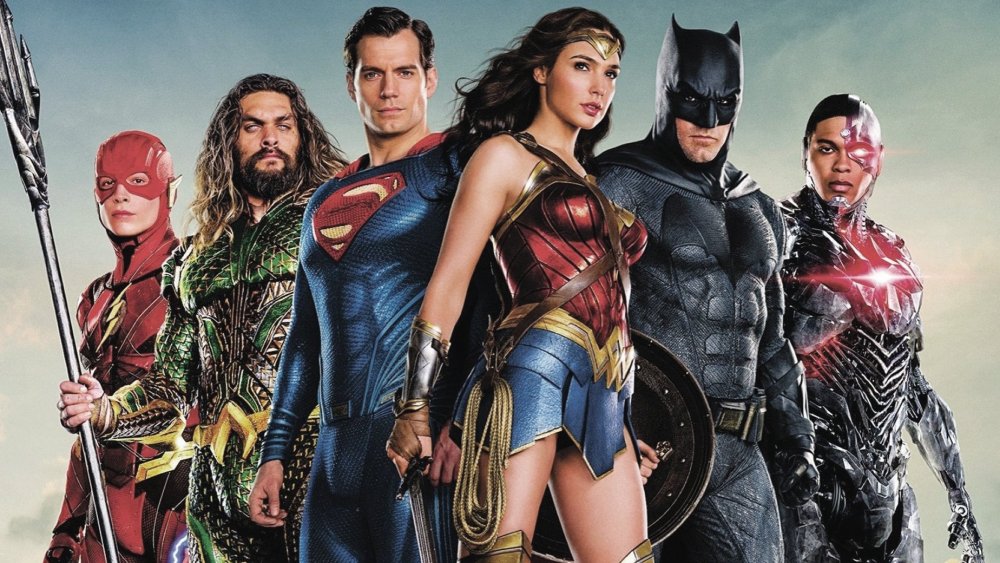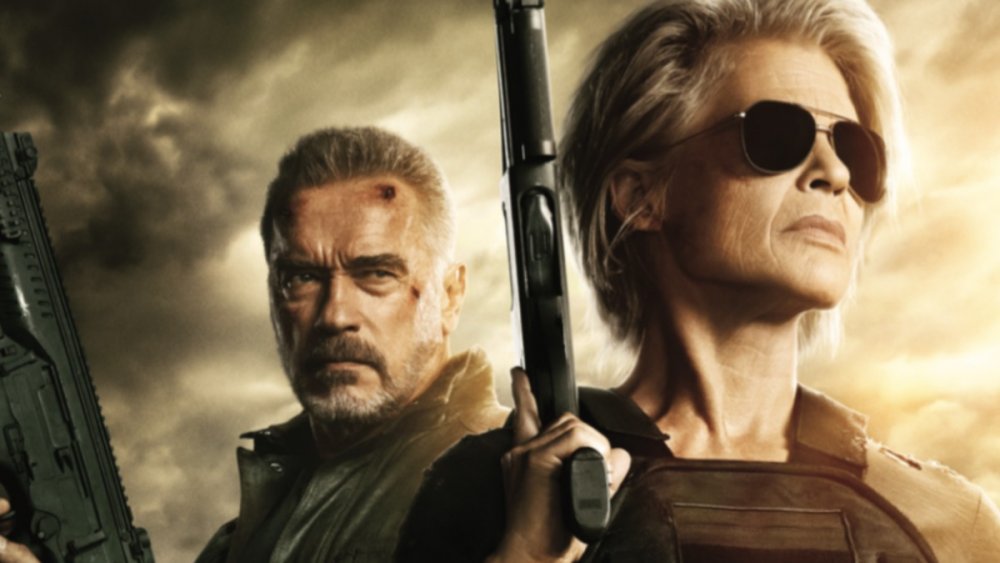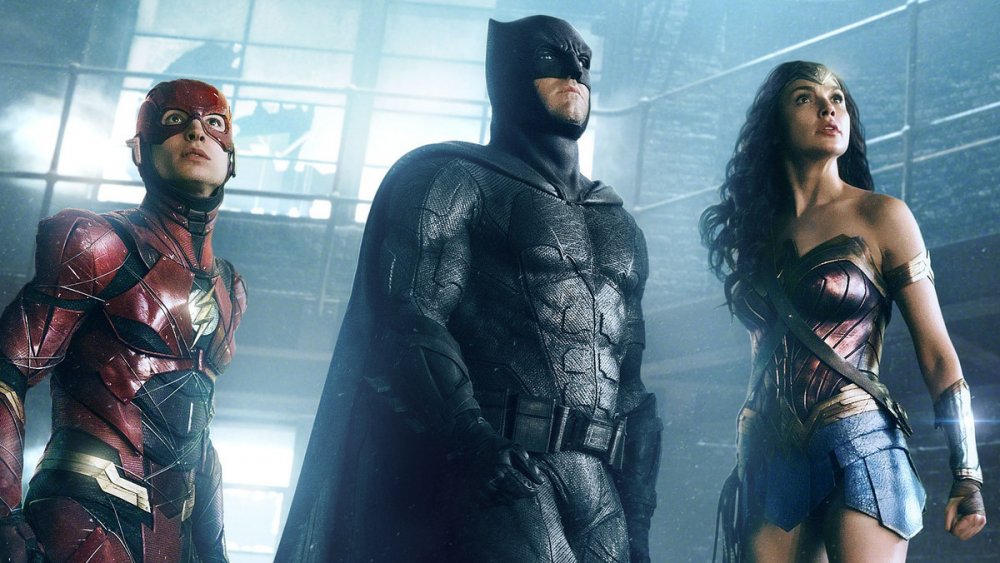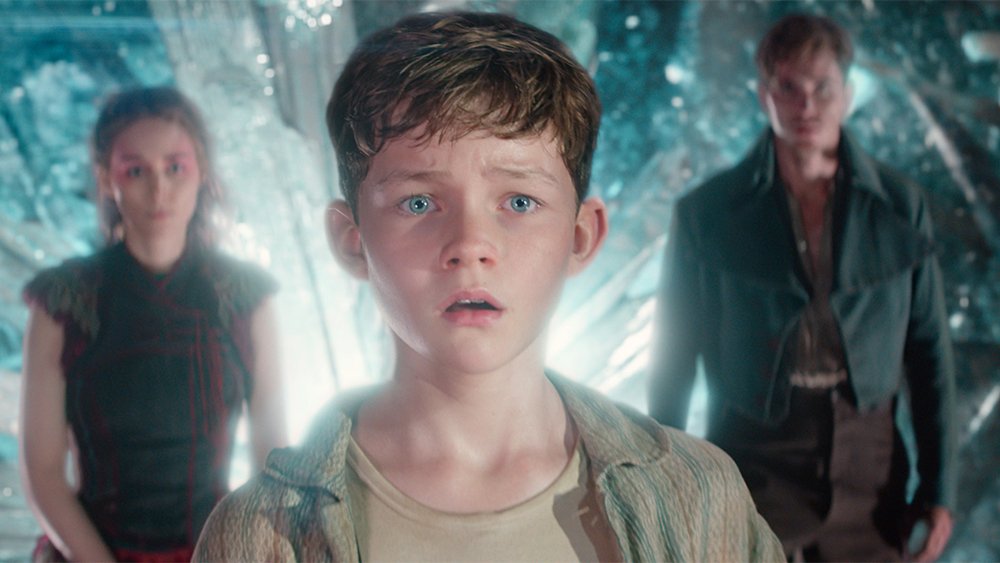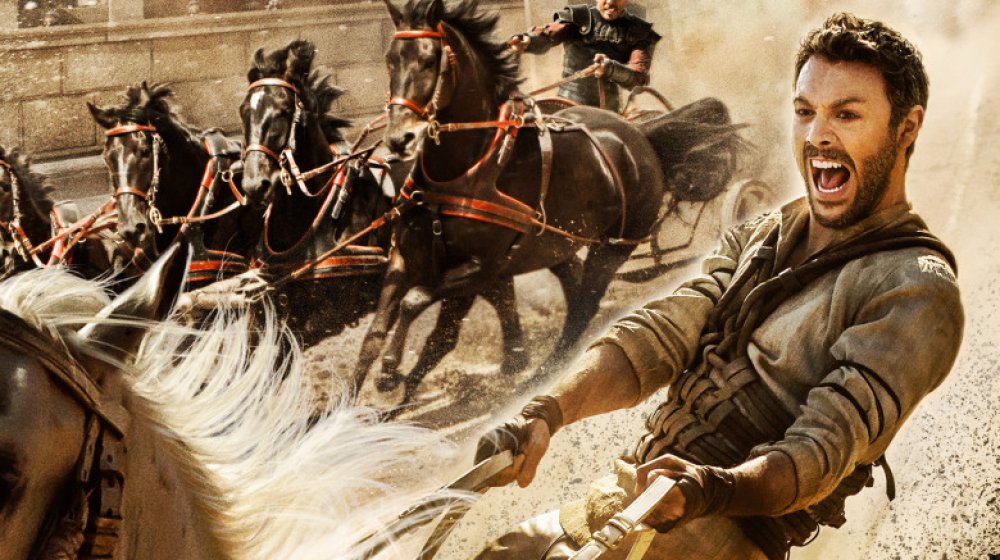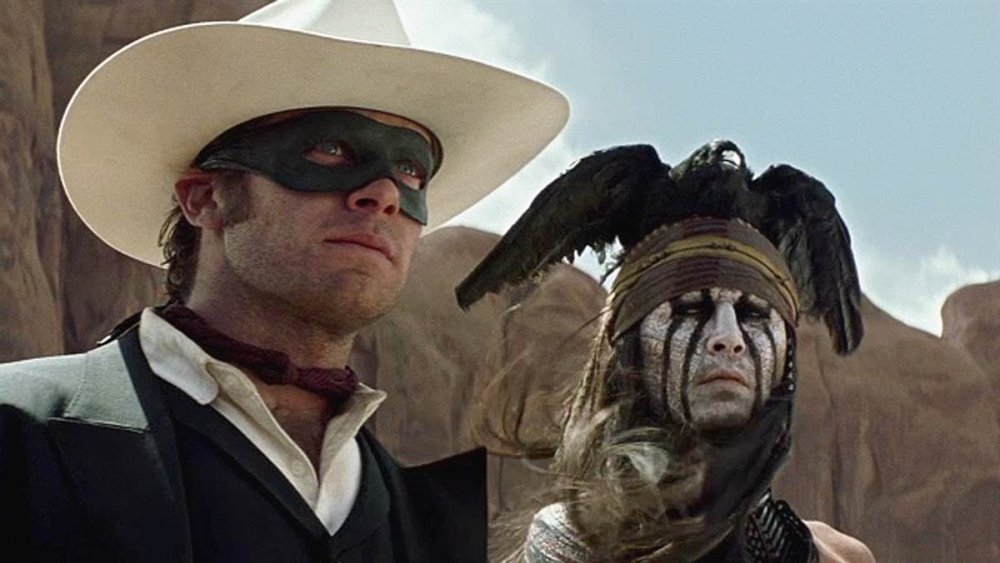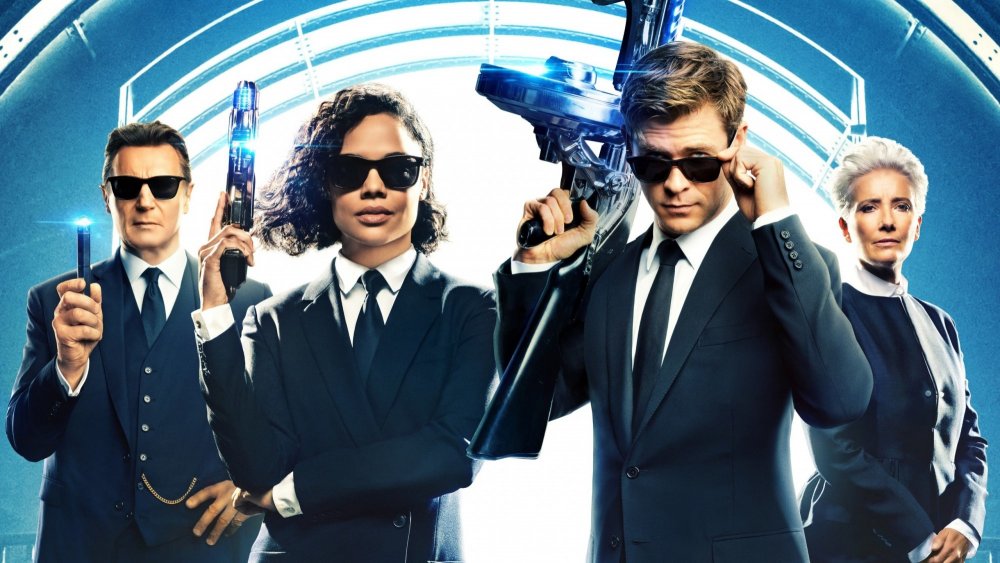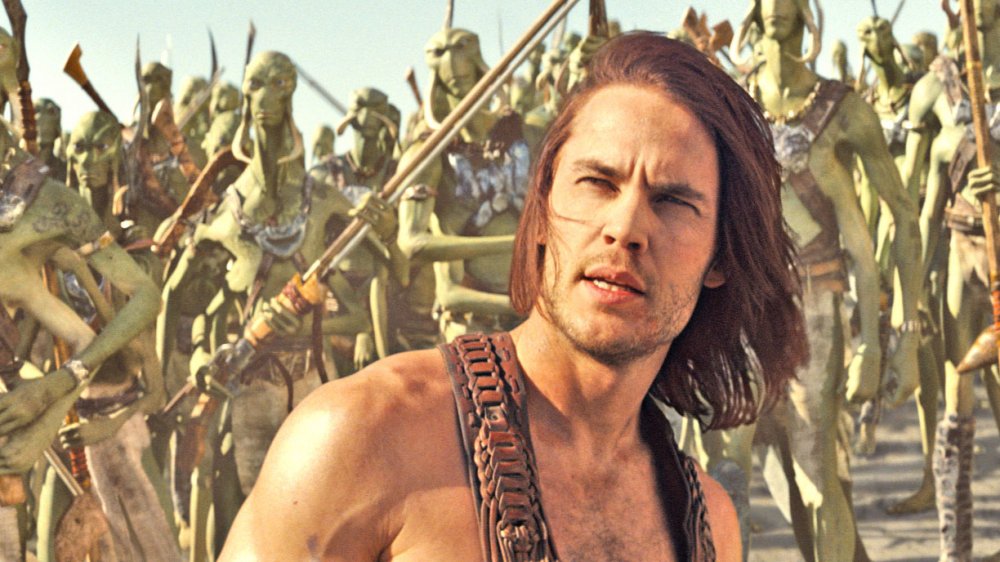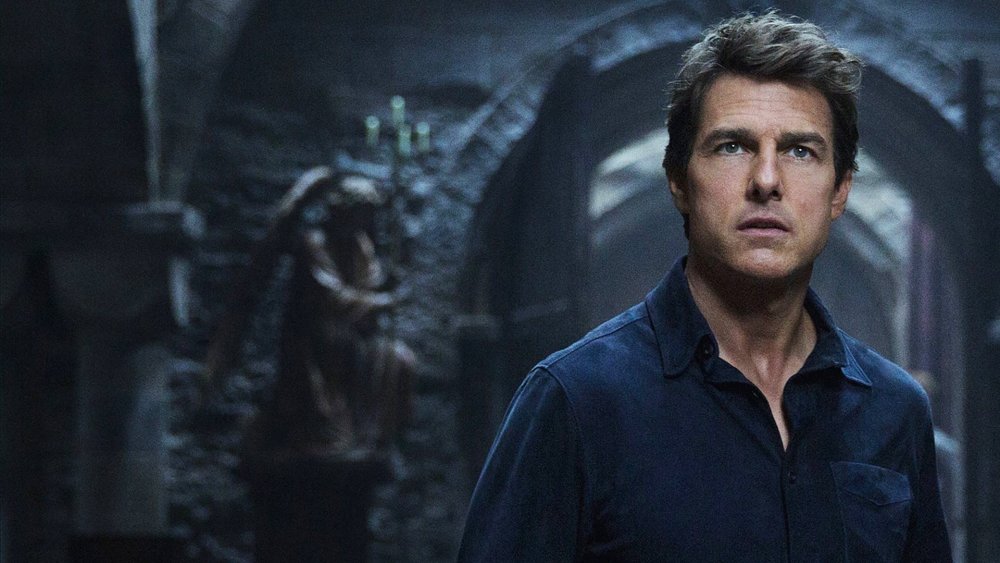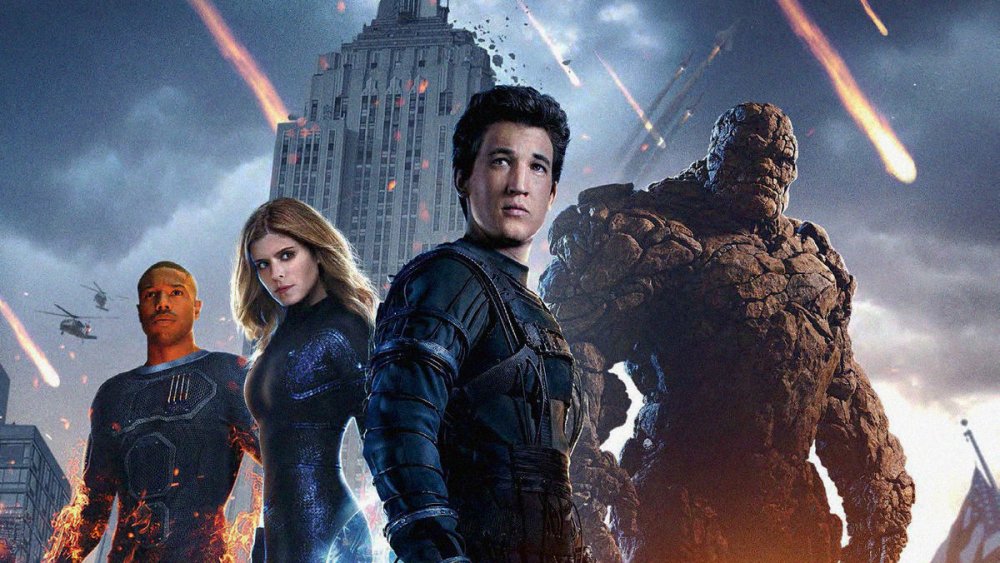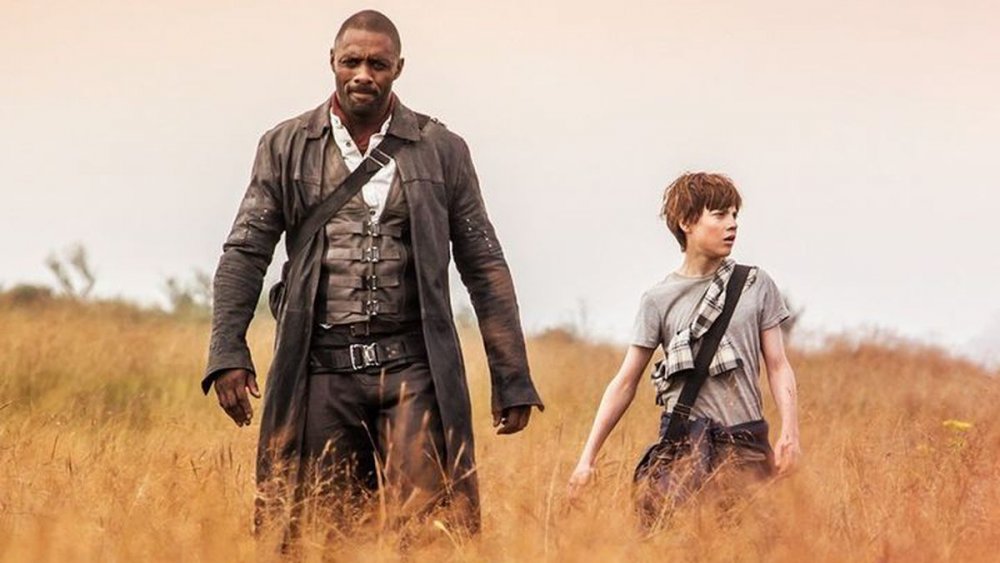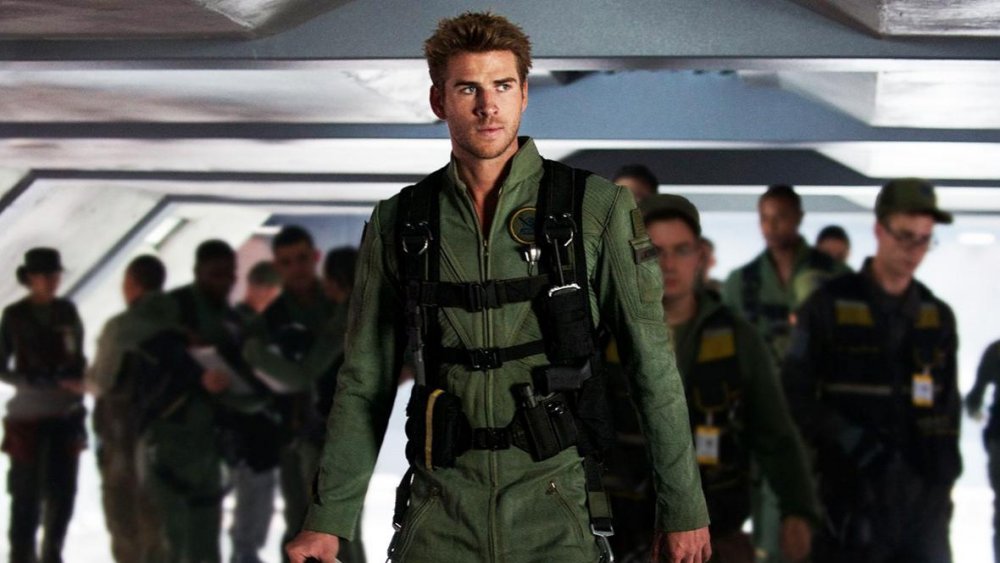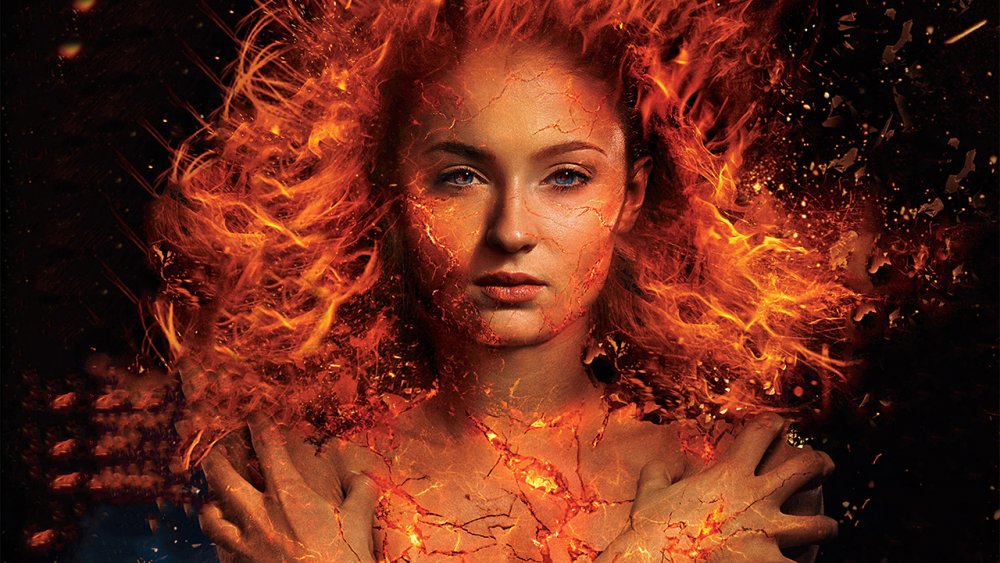The Most Overhyped Movies Of The Past Decade
The Hollywood hype machine can be pretty darned effective. Millions upon millions of dollars get poured into the promotion of your average tentpole film, and marketing types are experienced and skilled at getting butts in seats. Even a film with a staggeringly huge budget is bound to make money, as long as it delivers on the promotional materials — but that's an important qualifier. If your movie fails in that respect, all the expensive special effects and marketing hype in the world often won't be enough to save it.
Since the golden age of superhero cinema began in earnest with the advent of the Marvel Cinematic Universe, it's been an increasingly crowded marketplace for high-budget, high-concept movies, many of which feature beloved characters that cost a lot of money to use. Getting the moviegoing public psyched for such films by cranking up the hype machine to 11 is key to their success, but it also means that when they fail, they leave an extra-crappy taste in the mouths of fans who will inevitably take to social media in droves to sarcastically wonder just what all the hype was about.
The decade from 2010 to 2019 featured more than its share of big, costly flicks with ubiquitous marketing whose arrival in theaters was heralded by the sound of a big, deflating balloon. These are those films.
Terminator: Dark Fate
Terminator: Dark Fate had all the ingredients for rehabilitating a flagging franchise. It ignored the crappier films in the series (like 2018's successful sequel Halloween), it brought back producer James Cameron and star Linda Hamilton, it featured a cast of hot young stars, and it was helmed by the very capable Tim Miller, director of the smash hit Deadpool. The film enjoyed a massive marketing campaign, and Twitter exploded with praise after its preview screenings. It looked poised for a huge opening weekend... which utterly failed to materialize.
Dark Fate became one of the biggest money-losers of 2019, taking in only $261 million against a $185 million budget. The prevailing theory: younger audiences simply didn't care (Terminator 2, to which Dark Fate positioned itself as a direct sequel, was released in 1991), and the franchise's core audience of older viewers just wasn't enough. The film could herald the beginning of the end of the "belated sequel to decades-old property" trend; it may already have sunk planned revivals of the Alien and Predator franchises, which is probably not a bad thing.
Justice League
2017's Justice League should have been a box office smash. Sure, the previous year's Batman v Superman: Dawn of Justice underperformed slightly, given that it featured the titular icons onscreen together for the first time — but Justice League got the whole band together, including Ben Affleck's Batman, Gal Gadot's Wonder Woman, Ezra Miller's Flash, Ray Fisher's Cyborg, and Henry Cavill's Supes. Unfortunately, trouble reared its head far in advance of the flick's release, when director Zack Snyder was forced to depart the production due to a family tragedy.
The Avengers' Joss Whedon stepped in, and by some accounts, he re-shot over half of the film — and in doing so, he altered the picture's narrative drastically. Justice League reportedly cost $300 million to produce, and some reports put the true number (after Whedon's reshoots) at far north of that. Throw in a massive marketing campaign, and the flick would have needed to gross roughly a billion dollars worldwide just to break even. Somehow, though, the first big-screen assembling of the beloved superhero team managed only $658 million at the worldwide box office, and its failure prompted a massive course correction for the DC Extended Universe. Fans have called for Snyder's cut of the film to be released ever since, which seems highly unlikely to ever happen.
Pan
2015's Pan, an origin story for Peter Pan, gambled its $150 million budget on the power of the family dollar. Released during the lead-up to the holiday season, the flick's marketing pulled out all the stops, bombarding weekend and evening television audiences with trailers that showed off the film's expensive special effects. It boasted an all-star cast that included Hugh Jackman, Rooney Mara, Amanda Seyfried, and Cara Delevingne, and its updated take on a classic story looked poised to draw in families right on through to the new year.
Unfortunately for studio Warner Bros., two significant factors foiled this plan: it turned out that kids didn't really care about Peter Pan's origin, and the film itself wasn't very good. Critics blasted it for its weak narrative and severe over-reliance on CGI, not to mention some highly questionable creative choices (if you've ever wondered what Nirvana's "Smells Like Teen Spirit" as sung by a bunch of swashbuckling pirates would sound like, this is the film for you). Stiff competition from The Martian and Hotel Transylvania 2 proved to be the nail in the coffin for Pan, which failed to even come close to making back its budget with a $128 million dollar global take.
Ben-Hur
1959's Ben-Hur, a Biblical epic starring Charlton Heston, sported a list of superlatives a mile long. It was the most expensive film ever made at the time, with the largest sets ever created for a film production; it won an unprecedented 11 Academy Awards, and became the second-highest grossing movie in history behind only Gone with the Wind. Its chariot race sequence also set a standard for stunt work in Hollywood films; nobody could argue that the movie wasn't incredibly significant. Why anybody thought a $100 million, CGI-heavy remake was a good idea in 2016, though, is anybody's guess.
The remake arrived at a time when historical epics in general were falling flat at the box office; its marketing attempted to play up the action and battle sequences for younger audiences, who were much more interested in watching Iron Man and Captain America punch each other. Additional marketing expenditures aimed at roping in the faith-based crowd were slightly more successful, but with a picture as pricey to produce as Ben-Hur, that simply wasn't enough. Throw in a no-name cast and savage critical notices, and you had a recipe for one of the biggest flops of its year — one that ended up losing around $120 million for studios Paramount and MGM.
The Lone Ranger
The troubles with The Lone Ranger began long before the film was released. Concerns over its budget nearly caused studio Disney to pull the plug on the $250 million adventure more than once during production, and its first promotional stills — of Johnny Depp as Tonto in the most egregiously weird makeup anyone had ever seen — prompted serious concern (and head-scratching, and derisive laughter) from the entire internet. The flick, which was intended to rope in the kind of family audiences that flocked to Depp's Pirates of the Caribbean pictures, debuted in early July 2013 against what should have been manageable competition — Illumination's animated sequel Despicable Me 2 — and the House of Mouse threw good money after bad with a huge marketing push for The Lone Ranger.
As you might have guessed, it didn't help. The movie was a perfect storm of issues; Westerns haven't typically done well in ages, star Armie Hammer has never proven an ability to open a tentpole movie on his own, and Despicable Me 2 ended up being a smash hit, just to name a few. The Lone Ranger became one of the biggest bombs of the year, garnering only about $260 million at the worldwide box office and adding up to a staggering $190 million loss for Disney after marketing expenses. Good thing ol' Mickey had Iron Man to bail him out.
Men in Black: International
By all accounts, Men in Black: International wasn't very good, but that simply shouldn't have mattered. It was a continuation of a beloved franchise, its trailers (which were ubiquitous in the month or so leading up to its June 14, 2019 release) looked great, and its stars Chris Hemsworth and Tessa Thompson were seen together in the smash hit Marvel efforts Thor: Ragnarok and Avengers: Endgame, in which they displayed effortless and charming comedic chemistry of the sort that seemed perfect for a new MiB movie. The four-quel debuted against virtually no competition, and its giant marketing push should have all but forced early summer moviegoing audiences into theaters.
This utterly failed to happen. The movie posted a dismal $30 million opening weekend, by far the lowest in franchise history, and struggled to a $253 million global box office take over its run, also a franchise low. It was only fortunate for studio Sony that the $110 million picture had two co-financiers on board, an arrangement which may have prevented MiB: International from becoming the death knell of the franchise.
John Carter
Numerous attempts have been made to adapt Edgar Rice Burroughs' Barsoom novels to the screen, none successfully; it really wasn't until the advent of CGI and insane budgets that the story could have been pulled off successfully. Published in the early 20th century, the novels deal with a Civil War veteran named John Carter who is transported to Mars, where he becomes caught up in a struggle over swindling resources between the planet's inhabitants.
The series inspired legions of sci-fi works to follow, and Disney's 2012 adaptation of the first novel, A Princess of Mars, might have kicked off a money-printing franchise if it had been handled properly. In fact, the movie itself isn't bad, but its ginormous marketing push was part of the problem. The vague trailers, action-heavy but devoid of plot elements, gave viewers absolutely no sense of what the story was or why they should care about it; its renaming to the generic-sounding John Carter made sure it would never stick in anyone's mind, and star Taylor Kitsch proved to be the opposite of a box office draw. It was one time that the Mouse House's formidable marketing machine failed it completely, and the $250 million picture went on to gross $284 million worldwide, ensuring that it would go down in history as one of the biggest bombs of all time; after marketing costs, most sources put Disney's loss in the neighborhood of $200 million.
The Mummy
There are would-be franchise starters, and then there is The Mummy, the failure of which doomed an entire cinematic universe. On paper, it looked like a sure thing; a dark 'n gritty reboot of a well-liked film series (launched with the Brendan Fraser-led 1999 hit of the same name), starring one of Hollywood's most bankable stars (Tom Cruise) opening against non-existent competition (the low-budget, slow-burn thriller It Comes At Night was the highest-profile release opening the same weekend). Unfortunately, movies aren't made on paper.
The movie's budget-to-gross ratio wasn't terrible; it cost $125 million to produce, and clocked a respectable $409 million worldwide. Studio Universal, however, needed more from the picture — a lot more. As it was intended to kick off its interconnected Dark Universe featuring all of its movie monster properties, the studio poured an unreasonable amount of money into The Mummy's promotion. The tepid domestic box office illustrated just how heavily future entries would have to rely on international returns to be profitable, and they wouldn't have the benefit of Cruise in the lead. When it was all said and done, the movie basically ended up being a wash — and it ended up being not only the first film in the Dark Universe, but the last. Universal course-corrected by partnering with Blumhouse to release lower-budget monster movies based on its legacy properties, which so far is looking like a much better plan.
Fantastic Four
Marvel's First Family, the Fantastic Four, has proven notoriously difficult to adapt for the screen. Two films produced by Fox Studios in 2005 and 2007 posted middling box office and even generated even more middling reactions from fans (and starred future Captain America Chris Evans as Johnny Storm), but the 2015 reboot Fantastic Four (inexplicably stylized as Fant4stic) boasted the involvement of a hot young director (Josh Trank, Chronicle) and even hotter young stars (Michael B. Jordan, Miles Teller, and Kate Mara), and it advertising blitz promised that the property would be given a deadly serious, body horror-tinged treatment.
Trank would later blame studio meddling, and the studio would blame Trank, for the film's fate: utter, complete, legendary failure. Fantastic Four posted some of the worst reviews of virtually any superhero film, and its $167 million global box office take — paltry by the standards of comic book films in general, and jaw-dropping for a Marvel property — was reported to have resulted in a loss of around $60 million for Fox. The film was simply terrible, and left observers wondering if one of Marvel's premier superhero teams was just plain unadaptable.
The Dark Tower
Stephen King's multi-novel opus The Dark Tower was always going to be a tricky property to bring to the screen. Studios Universal Pictures and Warner Bros. spent years developing different iterations of the project; directors J.J. Abrams and Ron Howard were both attached at various points, and for awhile, it looked like the sprawling epic would comprise multiple films plus a tie-in TV series. In 2015, Sony Pictures took on the task of adapting The Dark Tower into a single feature film, leaving anyone familiar with King's novels puzzled as to exactly how that was going to work.
The answer was simple: it didn't. Despite an intriguing marketing campaign centered on the charismatic presence of Idris Elba in the lead role of Roland Deschain, the film was sunk largely by advance word of mouth which confirmed that it was every bit the jumbled, confusing mess that King fans were hoping against hope that it wouldn't be. Although it was modestly budgeted at $60 million, The Dark Tower's stunningly poor global box office take of $113 million ensured that Sony would take a whopping loss on the picture, and that its planned sequels would never come to fruition. As a happy post-script to the story, Amazon finally gave the property the treatment it deserved, adapting it into a TV series which will debut in 2020.
Independence Day: Resurgence
The 1996 sci-fi/action flick Independence Day, a classic yarn in which killer aliens invade the Earth only to be repelled by a band of plucky heroes, was a towering success for Fox Studios and the film's director, explosion-meister Roland Emmerich. Helped along by the star power of Will Smith in his box office prime, the flick raked in $817 million worldwide; if a sequel had been produced in the few years that followed, it almost certainly would have cleaned up as well. Unfortunately, Fox decided to wait for 20 years to trot Independence Day: Resurgence into theaters — and the huge gap between films was the least of the belated sequel's problems.
First and foremost, Smith did not return to reprise his role; second, the movie's marketing blitz focused on its huge, CGI-heavy action set pieces, promising a film that was devoid of the original's personality. Its summer 2016 release put it up against superhero pictures (like Batman v Superman: Dawn of Justice and X-Men: Apocalypse) which also featured heavy doses of CGI destruction, and the Pixar hit Finding Dory (in only its second week of release) was still gobbling up the family box office dollar. The result was predictable. Independence Day: Resurgence posted an astonishingly weak $41 million opening weekend on its way to a $389 million global take, the vast majority of which came from overseas markets. Would the presence of Smith have reversed its fortunes? We'll never know.
X-Men: Dark Phoenix
Dark Phoenix, the climactic swan song of Fox Studios' long-running X-Men franchise, was released after the studios' absorption by Disney. This made the picture a gamble long before it ever hit screens; savvy audiences knew full well that these characters were on the brink of being rebooted into the beloved Marvel Cinematic Universe, and the most recent entry in the Fox franchise, X-Men: Apocalypse, failed to deliver. Compounding matters, the Dark Phoenix storyline — one of the most popular in all of Marvel lore — had been adapted and fumbled before, in 2006's hot mess X-Men: The Last Stand, and that film's writer, Simon Kinberg, was returning not only to write Dark Phoenix, but to direct.
Shortly before the film's release, it became publicly known that its entire ending had to be re-shot due to unintended similarities with Captain Marvel, the blockbuster MCU effort from earlier in the year. Against all odds, though, the film's ubiquitous trailers made it look like a cohesive, daring, action-packed adventure chock full of committed performances from the likes of Sophie Turner as Jean Grey and James McAvoy as Charles Xavier.
Unfortunately, exactly none of that was correct. Dark Phoenix bombed horribly, with its lukewarm rehashing of its source material dragged down further by ridiculously phoned-in efforts from pretty much the entire cast; its tacked-on ending was the final insult. The X-Men deserved better, and they'll get it — in the MCU, where they belong.
